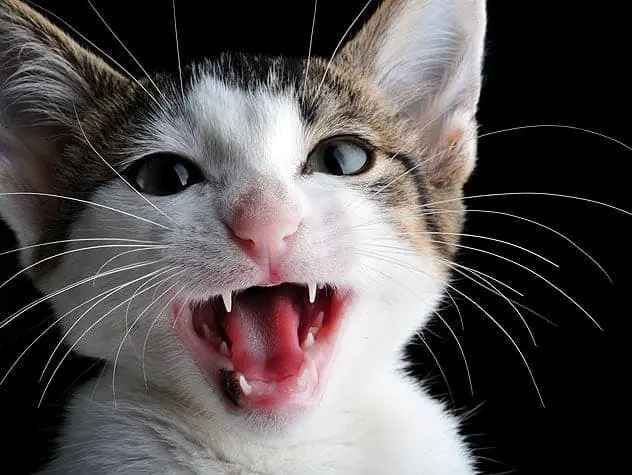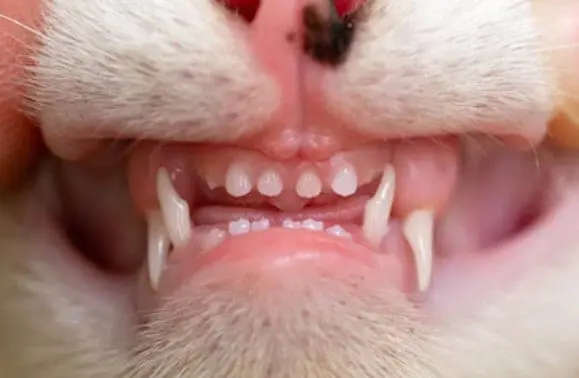For the overall health and well-being of your pet. This includes taking care of their baby teeth, also known as deciduous teeth. It is not uncommon for pet owners to overlook their cat’s baby teeth, assuming that they will fall out and be replaced by permanent teeth. However, baby teeth play an important role in your cat’s oral health and should be properly cared for.
Cats are born with a set of baby teeth, which typically start to fall out at around 3-4 months of age, and are replaced by permanent teeth around 6 months of age. While baby teeth may be small and not as noticeable as permanent teeth, they are still important for your cat’s ability to chew and eat properly. If baby teeth are not properly cared for, they can become infected or cause problems with the development of permanent teeth.
To ensure that your cat’s baby teeth are healthy, it is important to schedule regular dental checkups at the Veterinary Dental Center of Atlanta. During these checkups, our team of experienced veterinarians will examine your cat’s teeth and gums and recommend any necessary treatments. Additionally, at-home dental care such as tooth brushing and providing dental chews can also help keep your cat’s baby teeth healthy.
Don’t overlook the importance of your cat’s baby teeth. Schedule a dental checkup at the Veterinary Dental Center of Atlanta to ensure that your cat’s baby teeth are healthy and properly cared for.
Just like humans, cats have baby teeth that they lose before their permanent teeth erupt. That’s sometimes a very good thing because kitten teeth can be extremely sharp.
Even though your kitten doesn’t mean to hurt anyone, those needle-tipped teeth can cause their fair share of damage.
Let’s talk about when cats lose their baby teeth, and what can you expect.
Oral Exams Help Get Kittens off to a Great Start
We get new kittens off to a great start in life with included oral care exams at every vet visit, starting with their very first. We can readily see a lot of what’s visible above the gum line, but we can’t see what’s hiding underneath—for that we need dental x-rays.

Growing Baby Teeth
Kittens develop their first set of teeth at around 3 to 4 weeks of age. When the deciduous or baby teeth begin to erupt they help promote the weaning of the kittens, because of the irritation the teeth cause the mother cat when nursing. The deciduous teeth are small enough to fit the kitten’s mouth, and fairly fragile compared with adult cat teeth. They are also slightly translucent in color because the tooth tissue has a lower density.
When Do Cats Lose Baby Teeth?
Cats begin losing their baby teeth at around 12 weeks or 3 months. Although the timing varies between animals as much as it does among humans, the average kitten will have lost all her baby teeth by between 6 and 9 months old. By this time, the majority of the permanent teeth should have erupted, provided there are no complications.

Does Teething Cause Discomfort?
Kittens experience minimal discomfort when teething. Her gums might become sore and swollen, and if she refuses her food it could be an indication that her mouth is tender. This is caused by the development of the permanent teeth in the gums, which applies pressure to the roots of the baby teeth.
The pressure stimulates the kitten’s body to begin absorption of the roots, after which the crowns loosen and drop out. Your kitten might look for something to chew on to relieve the tenderness, and you might also notice her drooling or detect an unusual smell on her breath. This is distinctive to the teething process and usually goes away once all the teeth have erupted.
Retained Teeth
Some cats don’t lose their baby teeth, and end up with a condition known as “retained deciduous teeth.” This most often affects the canine teeth or “fangs,” and for a short while your kitten might even have two fangs on either side. These can cause problems such as early decay due to food being trapped between the teeth and forming plaque. If you notice this in your kitten, please let your veterinarian know. The retained teeth may need to be removed for your kitten’s oral health.
Getting Through Teething
While your cat loses her baby teeth, expect to find some tiny kitten crowns lodged in bedding, furniture and rugs. These drop at odd times including when the kitten is eating. You can help relieve your kitten’s teething pains by providing food or treats to keep her teeth and gums healthy. Look for toys that are safe for her to chew.
We do recommend starting your kitten out early having her teeth brushed regularly at home. This way, once the teething process is complete, you have an established dental hygiene program in place.
